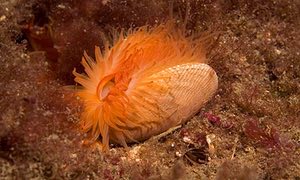Condemnation as scallop dredger wrecks rare flame shell reef off the west coast of Scotland
A rare flame shell reef off the west coast of Scotland has been 'devastated' by a scallop dredger. The Loch Carron reef near Plockton (Scottish Gaelic:Am Ploc) was intensively dredged on two occasions in an act of devastation that could take decades to recover. Flame shells live hidden on the seabed inside nests built from shells, stones and other materials around them. Many hundreds of these nests can combine to form a dense bed, raising and stabilising the seabed. This then attracts many other creatures. Flame shell reefs are noted as good hunting grounds for young fish, and provide a vital habitat for hundreds of species, including scallops.
However, flame shell beds are vulnerable to mechanical disturbance, particularly from bottom trawls and dredges. In the present incident at Loch Carron it has been reported that the same dredger had visited the area twice in April, making repeated passes close to the shore. This has wrecked the reef and as reported by BBC Scotland local marine biologist Sue Scott said: "Divers have seen hundreds of dead and dying flame shells.
"The seabed has been ripped up and there's damage to marine life - starfish with legs missing, dead squat lobsters, dead spider crabs and smashed sea urchins.
"It's just devastating."
This has led to calls for further marine protection measures to be increased. In the same BBC report Open Seas organisation spokesman Phil Taylor said: "Such reckless damage for the profit of just one boat is subsea scandal. It brings shame on our seafood industry, damages the future of the fishing industry and the productivity of our sea.
"Recent measures designed to manage scallop dredging are totally inadequate. For the sake of our fishing long term, we need fundamental reform of the way we spatially manage bottom-towed fishing."
A spokeswoman for the Scottish government said: "These reports are worrying and will be investigated.
"But it is worth noting that there are already strong measures in place to protect valuable marine habitats around our coastline.
"We work closely with local communities and the inshore fisheries groups to review what, if any, additional protective measures are required."
"We will continue this dialogue as we seek to balance the need for legitimate and responsible fishing activity whilst simultaneously preserving our incredibly diverse marine environment."






